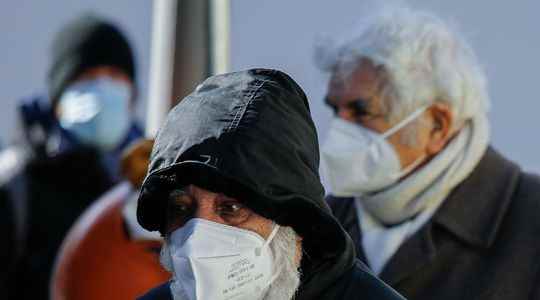“We are more and more worried with each passing day,” breathes Etienne Klein, president of the Ellye association, which brings together patients with lymphoma or leukemia. The new cases of Covid-19, which have been falling in recent weeks, are starting to rise again slightly, and on Monday March 14 the government must mark the end of almost all measures to fight the epidemic. The mask will no longer be compulsory in closed places (apart from transport) and the health protocol will be lifted in companies. “We decide to lift the restrictions while the contamination curves remain at a higher level than the waves of the previous two years, so we are not relaxing due to the epidemic context, but the political agenda”, laments Etienne Klein.
Worse, immunocompromised patients, who are not protected by vaccination despite repeated injections, remain the first exposed to the disease. In some departments, they now represent nearly 30% of patients admitted to intensive care. “For us, it’s dramatic, because we never know how we will react to the virus, we live in fear”, testifies Lydie Combe, a 52-year-old nurse, who is fighting against lymphoma. The solutions offered to this patient to give a boost to her weakened immunity are extremely limited. In an interview with Le Parisien on Saturday, Prime Minister Jean Castex announced that immunocompromised patients will be able to receive a fourth injection on Monday. A measure that could help boost antibody levels in people with declining immunity, but which will have little effect for those in whom the first three doses have caused no response, specialists warn . In addition, monoclonal antibodies (synthetic antibodies developed from the natural response of a patient affected by Covid and injected into immunocompromised people) exist, but their access remains restricted.
The FFP2 mask solution
As a result, these people end up imposing more or less severe isolation on themselves. “I no longer go to the shops when there are too many people, and I avoid closed places where you don’t wear a mask, like in restaurants”, confirms Evelyne Marceau, a 65-year-old retiree. For this patient with leukemia, the new relaxation of health rules adds an additional risk. “Many immunocompromised people work in companies, and for them the end of the mask at work is akin to a real endangerment”, underlines Etienne Klein.
Admittedly, these populations can still use an FFP2 mask to go to closed places. Much more protective than a surgical model, it has the characteristic of being very filtering. “An FFP2 mask considerably protects against the risk of infection, but for that it must be well adjusted, and it must be changed regularly”, explains Antoine Flahault, epidemiologist at the Institute of Global Health in Geneva.
Since February, immunocompromised people can obtain it in pharmacies with a prescription. Good news, underline the patients, but which cannot be enough in the face of a still significant circulation of the virus. “This protection is necessarily less when the people around you stop wearing the mask”, underlines Yvanie Caillé, the president of the Renaloo association which brings together patients with kidney failure or transplants, and very often immunocompromised.
Call for solidarity
Fragile people did not wait for the end of the restrictions to get started. “The FFP2 has been all the time, for more than two years”, evokes Lydie Combe. With its limits: “I can’t impose it on my family, so there’s always a risk.” “As we let the virus slip away, we risk seeing fragile people infected in their homes by relatives”, agrees Antoine Flahault, who thus fears that mortality will remain at a fairly high level. Evelyne Marceau notes, resigned: “For us, we will have to continue to wear the mask … Social distancing, all the precautions that were taken for the general public will have to continue.”
At the end of February, the Minister of Health, Olivier Véran, announced the end of the measures in a tweet. He then underlined that this should not mean “the total absence of vigilance, in particular towards our immunocompromised and fragile fellow citizens”. A welcome message, but insufficient for patient associations. “We would have liked institutional messages calling for solidarity, but we have not obtained it for the moment”, regrets Yvanie Caillé.
